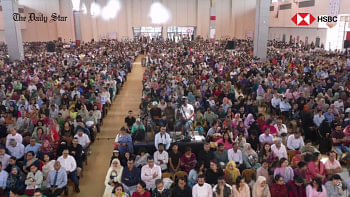How FMCG industry in Bangladesh is coping with lockdown

During the lockdown, the demand for food and other necessary items has been soaring high. People have been scurrying to buy all types of finished goods that are important for their daily lives. As such, the fast-moving consumer goods (FMCG) industry is facing a challenge unlike ever before. Some of the companies have already adapted to the situation, while others are having it rough.
The production end
All of the companies within the industry have their factories either in the outskirts of the capital or outside of it. Multinational corporations have their workers in the production end working in a rotational 3-day work cycle; half of the workers are working for 3 days straight and are afterwards replaced by the other half for 3 more days. They are ensuring that the procurement of raw materials is being done in high volumes to cope with the increased demand and to avoid extra costs. Companies like PRAN Foods and Akij Foods and Beverages (AFBL) are accommodating workers in factory premises and not allowing any outsiders.
Supply chain, sales and distribution
Tim Mirwat Hossain from Nestle's Supply Chain function said, "Our activities have become incredibly time-bound. It is a challenge to ensure that funds are properly being transferred and received because of the tight banking hours." Every company is providing the sales representatives and distributors with PPE. The pandemic has proven to be particularly challenging for the sales representatives. Despite that, PRAN Mr. Noodles recorded their highest sales even in the last month. Md. Shamsur Arefin, Head of Sales of PRAN UHT Milk said, "We don't spend two days on taking and delivering of orders anymore. Our sales representatives are now carrying the goods in the truck along with their Demand Signal Repository (DSR) reports while visiting the retail shops, and are distributing the necessary amount of goods as per the data suggests."
Embracing the new normal
All of the companies have adopted virtual working procedures. Unilever was the first company to go virtual, shutting down its offices on 14th March. For the careline workers of PureIt, Unilever arranged transportation facilities. Even in this time of crisis, Unilever didn't flatten the learning curve as the company observed its Learning Week from 19th to 23rd April. All of the employees participated in virtual learning sessions. Some companies like AFBL have reopened their commercial and financial departments in limited capacities on the 11th of May.
Adaption and innovation
Aarong Dairy and Nestle have introduced their in-house home delivery services during the lockdown and are now taking orders online or over the phone. Although Takeout is not a part of this industry, their idea of selling ready-to-cook burger ingredients as a part of their DIY campaign puts them on the FMCG map courtesy of technicality. All of the items that the burger joint has sold this lockdown have been in frozen form. Takeout's Marketing Executive Nabila Farzin said, "Our frozen DIY products were not only intended to reduce human interaction as much as possible but also to give our customers at home a fun task."
Far from a bed of roses
Companies whose target group are residents in the suburban and rural areas are struggling to get their products to the markets. Rezaul Karim, DGM Finance & Accounts of AFBL, said, "A large portion of our annual sales come from during the Eid festivals. This year it won't be the same and we have had to revise our sales targets." Moreover, since some retailers cannot open their shops, a lot of the goods will expire their shelf life before they can be sold. FMCGs will have to take these back and also account for the sunk costs.

 For all latest news, follow The Daily Star's Google News channel.
For all latest news, follow The Daily Star's Google News channel. 



Comments